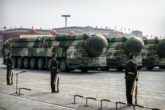August 26, 2025
Why Washington Can’t Ignore Bangladesh
This article was originally published in The Diplomat.
One year after its Gen Z-led revolution, Bangladesh finds itself at a fragile crossroads. While its interim government, led by Muhammad Yunus, has stabilized the country and initiated reforms, major challenges remain. Delayed elections, emboldened Islamist parties, difficulties in the implementation of reforms and ensuring accountability for past abuses, escalating lawlessness, a battered economy, and a prolonged refugee crisis all threaten to derail the country’s democratic renewal.
Washington’s longstanding partnership with Dhaka – built on democratic support, trade, development, humanitarian assistance, and security cooperation – has been strained at precisely the wrong time. Through aid cuts, tariffs, and an unpredictable strategic outlook since the start of 2025, U.S. influence in Bangladesh has been weakened just as China has sought to increase its footprint. To prevent backsliding and to counter Beijing’s growing role, the U.S. must renew its commitment to supporting Bangladesh in its transition period and beyond. Doing so will help ensure Bangladesh becomes a stable and independent democracy that is free from Islamist extremism and able to resist Chinese economic coercion, thereby reinforcing U.S. leadership in upholding stability and prosperity in South Asia.
While Bangladesh may seem peripheral to U.S. foreign policy interests, ignoring it would be a strategic error.
Although Bangladesh’s interim government has laid the groundwork for structural reforms, through the establishment of key reform commissions and the recent adoption of the July Charter, its political landscape remains fractured. The Bangladesh Nationalist Party (BNP), marginalized under Sheikh Hasina’s regime, demands swift elections, while the student-led National Citizen Party (NCP) calls for deep constitutional change. Formerly banned Islamist factions like Jamaat-e-Islami are reemerging, sparking fears of radicalization and erosion of Bangladesh’s secular foundations.
A temporary ban on Hasina’s Awami League (AL), alongside Operation Devil Hunt – a sweeping crackdown targeting former Hasina loyalists, resulting in over 48,000 arrests – has raised concerns about a renewed iteration of retributive, exclusionary politics. At the same time, social tensions are surging, with over 2,400 attacks on minorities and women, weapons theft, assaults on and by police, and rising extremist propaganda by Hizb ut-Tahrir and al-Qaida-linked groups having been reported since last August.
Read the full article on The Diplomat.
More from CNAS
-
In Brief: Increasing Tensions Between China and Japan Create Risks for the Region
This article was originally published in War on the Rocks. China’s latest pressure campaign targeting Japan serves multiple purposes for Beijing. One is to redirect domestic p...
By Jacob Stokes
-
China May Grab a Lead in the Race for Military Fusion
This article was originally published in The Wall Street Journal. America’s top diplomat for nuclear-weapons issues, Undersecretary of State Thomas DiNanno, revealed this mont...
By David Feith
-
Afghanistan Under Taliban Rule Makes the World Less Safe
This article was originally published in The Diplomat. The Taliban regime is expanding its provision of national sanctuary to terrorist groups with regional and international ...
By Annie Pforzheimer
-
Hearing on “India, China, and the Balance of Power in the Indo-Pacific”
Commissioners, thank you for the opportunity to testify at today’s hearing. There are few relationships that have the potential to be as consequential to the balance of power ...
By Lindsey Ford




